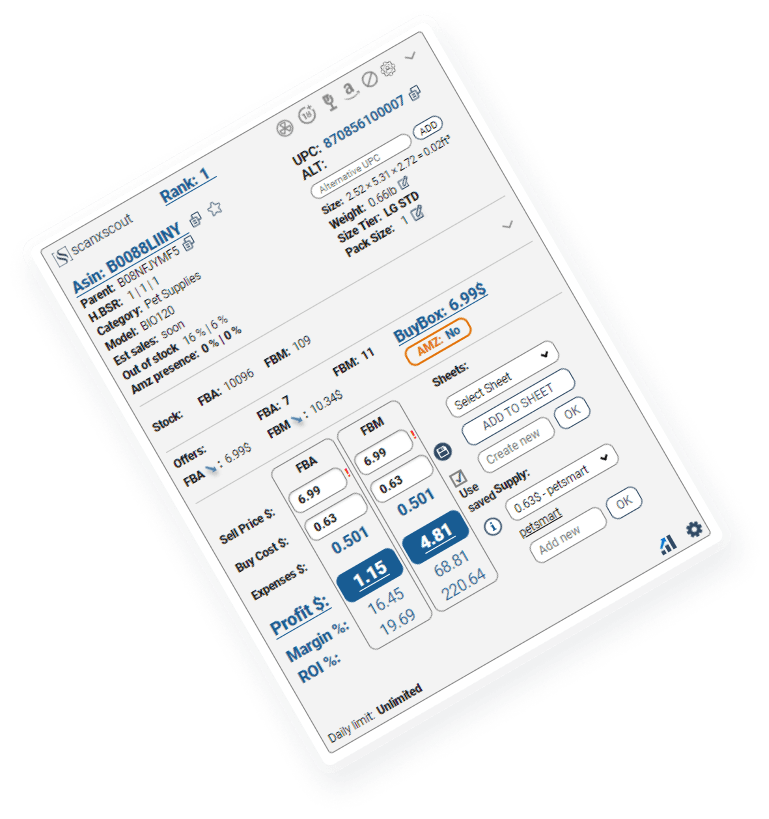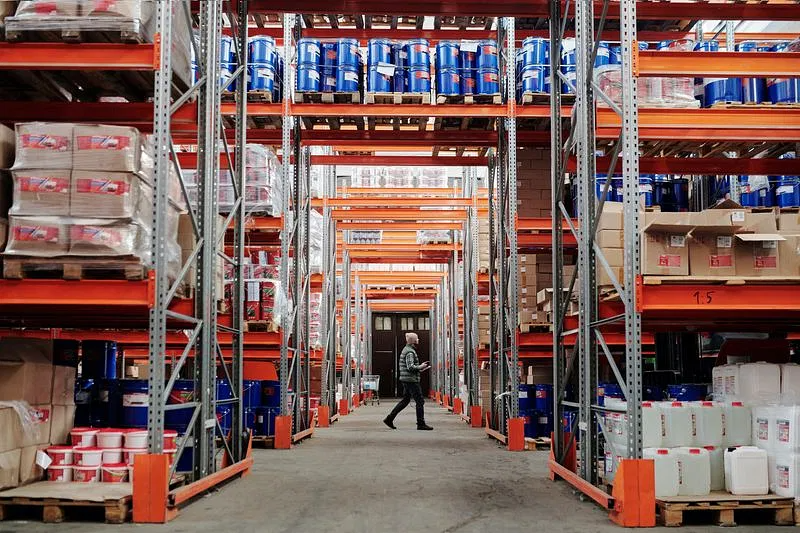Amazon has grown into a formidable platform that allows 300 million customers to find anything they want and 9 million selling partners to make money on it.
If we narrow the focus down to the wholesale model, it makes up an integral part here with about 26% of sellers using Amazon Wholesale. This business model is only inferior to the private label model.
What Is Amazon Wholesale?
Amazon Wholesale is a selling model that implies buying products in bulk at a lower price than if you bought them in retail stores. Then you can resell goods on the marketplace at a higher price.
Although it sounds simple, there are a bunch of aspects to look out for. Your product, your supplier, your fulfillment model – everything matters in the end.
Amazon Wholesale Step by Step
If you want to first look at this business model from afar, this bullet list of the most crucial points will clear up the overall wholesale process for you. Yo do the following:
- Register a professional seller account on Amazon.
- Find a good-selling product for resale.
- Do product research under which you make sure you’ll get a fairly high profit and check all the product parameters.
- Find multiple suppliers, discuss order terms and prices and select one of them.
- Once you received the final offer, recalculate the profitability.
- Order the product.
- Place it on Amazon, monitor stock levels and replenish them in advance.
Specifics of Wholesale Business Model
The wholesale model requires a special approach to sales. You don’t create your own brand, as in the case of the private label model. Instead, you resell branded products.
Unlike dropshippers, you deliver orders to customers yourself (unless you go for the FBA fulfillment method), but you need to purchase bulk items and manage stock.
And, unlike arbitrators who buy smaller quantities of goods and sell with lower profitability, wholesalers buy goods in bulk and resell them at retail price to get higher profits.
Pros & Cons of Wholesaling
No surprise wholesale has demonstrated to provide substantial profits to the sellers. Let’s consider the benefits that you can yield from Amazon Wholesale.
Market demand: You sell products of well-known brands with high demand. Customers are already looking for such products, which minimizes your marketing struggles.
Moderate competition: Amazon has fewer wholesalers than private brands, which will also work to your advantage.
Scalability: As long as you have customers longing to buy your items, there are no restrictions on the products you can sell.
Product flow: Once you see you are about to run out of products for sale, you can easily replenish the stock by making one more order from your supplier.
Despite numerous advantages, you still have to consider a couple of aspects if you want to start wholesaling.
High upfront investment: You will need to buy items in bulk from the supplier, which implies large investments from the very outset.
Overstocking: Unfortunately, wholesaling holds high risks of overstocking when you are stuck on goods with low demand. As a result, you run out of space in the warehouse and get a low return on investment.
Obligatory research: Since you have to make large investments, huge sums of money are at stake. This means diligent product and supplier research is imperative to win your place on the Amazon marketplace.
What to Consider Before Selling Wholesale on Amazon?
As we said before, the foundation of wholesale is to buy at a lower price and sell at a higher price. And the higher the number of products you buy is, the higher your profits are.
But Amazon wholesale could become a risky thing if not done properly. So, how to protect your Amazon wholesale business from such failures? Let’s look at the most crucial aspects to consider on the way to becoming a successful wholesaler on Amazon.
1. Explore Market for High-Demand Products
Your goal is to find products not yet present on Amazon or ones sold under a unique brand name. This will help you eliminate more competitors. As soon as you make a list of potential bestsellers, make sure customers will find them valuable (‘How can each product help customers solve their problem’?).
Study the key principles of successful product research below:
- Analyze customer reviews about each product and see what users’ feedback on the offer.
- Look for products with fewer sellers. By doing this, you eliminate offers from private brands and can find unique offers.
- Utilize product research tools to evaluate products by sales level, prices, reviews and other aspects.
- Avoid seasonal or trendy offers, as these items will lose their sales value over time or during certain timeframes.
2. Calculate Your Profits
Buy products with prices ranging from 15 to 50 dollars. This is an amount that allows buyers to make impulse purchases, while you increase sales and get a profit.
You have to consider your expenses on item storage and fulfillment as well. You can go for FBA (Fulfillment by Amazon) where you send goods to the Amazon warehouse to be processed, stored and sent to customers. Or else, you can choose FBM (Fulfillment by Merchant) where you store items and fulfill orders yourself.
Each option has its pros and cons, so check out the details to make sure you choose the right one for you.
Tip: You can also use the Amazon FBA calculator to better assess your profits. This tool is also an excellent option for determining the fees you will pay with Amazon for each sale.
3. Find Reliable Suppliers
The next crucial step is to find reliable suppliers. You can start with a quick search in Google including the name of your item and “authorized supplier” or “manufacturer”. In addition, take advantage of wholesale directory sites. Some of the most popular ones are 4wholesaleusa, BAOlink, Greatrep, Top Ten Wholesale, DHgate, and Manufacturer.
Now that we narrowed the search area, contact your suppliers to find out more about them. Here are some of the most significant aspects to mention:
- Examine their minimum order quantity.
- Find out what products they work with.
- Ask about the sale prices they can offer you.
- Request product samples to check the quality of the product.
In short, make a thorough check before selecting a supplier. And remember, you will become a partner. So the supplier must also trust you.
Tip: Share your goals. Tell the supplier how you will help them make a more profitable business and boost sales. The more you trust each other, the better it will work ultimately out for everyone.
Do I Need Wholesale License for Amazon?
As a rule, you do. You will need to apply for a wholesale license, with which you will be able to optimize tax payments and collect sales tax in the state where your business is registered (if you sell in the US). Each country’s legislation holds different requirements, so make sure to check them before starting a business on Amazon.
To start wholesaling, you will need the following:
- Employer Identification Number (EIN);
- E-commerce license (resale permit, wholesale license or some other depending on where your business is registered);
- Sales tax permit and tax identification number in the respective state/country.
Final Tips to Become Best-Selling Wholesaler on Amazon
Here are 10 essential tips to help you start and scale your wholesale business on Amazon:
- Register a professional seller account on Amazon, because an individual account doesn’t allow you to sell in bulk;
- Analyze the item thoroughly before selling – the profitable product is the key to success;
- Make sure the product has sufficient sales potential, its BSR is low and stable;
- Check that the product’s average rating is 4 stars and above with a small number of negative reviews;
- Make sure Amazon doesn’t sell this product, and Amazon is not in the Buy Box;
- Use seller’s tools to analyze the items in a more accurate and effective way;
- When contacting a supplier, showcase yourself as an advantageous partner;
- Buy product samples and test them out before placing an order from a supplier;
- Request product quality certificates, find out logistics, delivery time, vendor policy on returns and insurance;
- Carefully estimate all expenses.
The Takeaway
All the aspects described above prove that wholesalers have enough space to start a profitable online business on Amazon. Wholesale is a profitable model with moderate risks, good margins and scaling potential, as well as a predictable profitability level.
It can be easily managed, but still you need to make considerable investments in bulk ordering. With the right product and supplier selection you can make high profits and scale your business properly.


 725
725